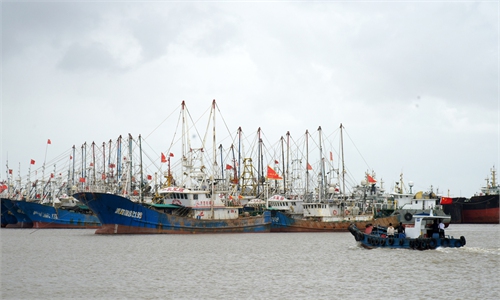China mulls law revision to deepen foreign-related fishery governance
Amendment to advance sector’s green development

Fishing boats line up at a port in Wenling, East China's Zhejiang Province, on July 31, 2024, to get ready for the beginning of the "small fishing season" on August 1. China implements an annual off-season fishing moratorium that starts on May 1, with nearly 120,000 vessels returning to port. It takes place during spring and summer, which are the main breeding and growth periods for marine species, so that marine fishery resources are effectively conserved. Photo: VCG
With the aim to deepen foreign-related fishery governance, a draft amendment to the Fisheries Law has been submitted to the ongoing 13th session of the Standing Committee of the 14th National People's Congress (NPC), China's top legislature, for deliberation.
China aims to strengthen resource conservation, enhance the quality and green development of the fishery sector through the revision. The draft, containing 88 articles in seven chapters, stipulates measures to promote and regulate aquaculture, tighten fishing management, strengthen fishery resource proliferation and protection, as well as enhance oversight, Xinhua reported.
The 13th session of the Standing Committee of the 14th NPC is being held in Beijing on December 21-25.
The main revisions in the draft amendment include clarifying the overall requirements for fishery development, and deepening foreign-related fishery governance. Additionally, the legal liability provisions have also been improved, according to Wang Xiang, an official from the Legislative Affairs Commission under the Standing Committee of the NPC.
China's current Fisheries Law came into force in 1986 and was amended in 2000, 2004, 2009 and 2013. Wang said the Fisheries Law has played an important role in promoting the development of the fisheries sector. However, as the modernization of the country's fisheries accelerates, "the current Fisheries Law faces new situations and problems during its implementation, making it difficult to better meet the actual needs of fisheries development under the new circumstances," he said.
The draft revision adds a new chapter on "supervision and management," which clearly defines the enforcement responsibilities of law enforcement agencies and maritime police. It also stipulates measures that can be taken during supervision and inspection, the management of fishing vessels entering and leaving ports, and the credit records of producers and operators, Xinhua said.
"The draft revision to the Fisheries Law primarily serves to better safeguard China's maritime rights and sovereignty," Zhang Junshe, a Chinese naval expert, told the Global Times on Monday.
The revision aligns with the current state of fisheries in our country. Deepening foreign-related fishery governance establishes specific legal provisions to be followed in the event of fishery disputes, Zhang said, noting that the revision does not target any regional countries and regions.
A draft law interpretation released by China's State Council on its website in 2019 showed that foreign fishing vessels engaged in illegal, unreported, and unregulated fishing activities are prohibited from entering China's ports, along with the penalties for those that do enter.
According to a previous draft released for public opinions in 2019, unauthorized foreign fishing vessels' entry into the waters under China's jurisdiction to engage in fishing production and fisheries resource investigation activities shall result in an order to leave or expulsion, confiscation of catches, fishing gear, fisheries resource investigation materials and equipment, and a fine of up to 5 million yuan ($685,000). In serious cases, the confiscation of fishing vessels may also be imposed.
Those who have already entered China's ports will have their catch and fishing gear confiscated, be ordered to leave or be expelled, and may face a fine of up to 5 million yuan. In severe cases, the confiscation of fishing vessels may also be imposed, it said.
The related fine in 2013's version of fisheries law was half a million yuan.
The draft seen in 2019 also said that domestic fishing vessels that engage in fishing activities on the high seas or in the jurisdictional waters of other countries without approval, or distant-water fishing vessels that conduct fishing activities within China's jurisdictional waters, shall be fined up to 1 million yuan and have their fishing gear confiscated. In severe cases, the fishing vessels may also be confiscated.




